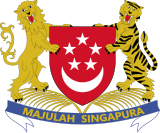| This article is part of a series on |
 |
|---|
|
|
General elections were held in Singapore on 23 December 1976. The result was a victory for the People's Action Party, which won all 69 seats, the third of four consecutive elections in which they repeated the feat. Voter turnout was 95.1%, although this figure represents the turnout in the 53 constituencies to be contested,[1] with PAP candidates earning walkovers in the other sixteen.
The abolished constituencies do include:
- Bras Basah. Merged with River Valley. Ho See Beng therefore moved house from Bras Basah to Khe Bong (just reflecting new development)
- Crawford. Merged with Kampong Glam. Ang Kok Peng therefore moved house from Crawford to Buona Vista (just reflecting new development)
- Hong Lim. Merged with Telok Ayer. Lee Khoon Choy therefore moved house from Hong Lim to Braddell Heights (just reflecting new development)
- Kampong Kapor. Merged with Jalan Besar. Yeo Toon Chia therefore moved house from Kampong Kapor to Ang Mo Kio (just reflecting new development)
- Sepoy Lines. Merged with Tanjong Pagar. Wee Toon Boon resigned.
- Stamford. Merged with Rochore. Andrew Fong therefore moved house from Stamford to Kampong Chai Chee (just in view of the new Bedok constituency)
The ten new wards include:
- Ang Mo Kio (from Nee Soon)
- Bedok (from Siglap)
- Boon Lay (from Jurong)
- Braddell Heights (from Paya Lebar, Serangoon Gardens, Thomson and Upper Serangoon)
- Brickworks (from Leng Kee & Pasir Panjang)
- Buona Vista (from Queenstown)
- Khe Bong (from Kuo Chuan & Toa Payoh)
- Kolam Ayer (from Geylang West, Jalan Besar and Potong Pasir)
- Marine Parade (from Katong and land reclamation)
- Radin Mas (merged part of Henderson & Telok Blangah)
Results
| Party | Votes | % | Seats | +/- |
|---|---|---|---|---|
| People's Action Party | 590,169 | 74.1 | 69 | +4 |
| Workers' Party | 91,966 | 11.5 | 0 | 0 |
| Singapore United Front | 56,191 | 7.1 | 0 | New |
| Barisan Sosialis | 25,411 | 3.2 | 0 | 0 |
| United People's Front | 14,233 | 1.8 | 0 | New |
| Singapore Malay National Organisation | 9,230 | 1.2 | 0 | 0 |
| Singapore Justice Party | 5,199 | 0.7 | 0 | New |
| Independents | 4,173 | 0.5 | 0 | 0 |
| Invalid/blank votes | 18,558 | - | - | - |
| Total | 815,130 | 100 | 69 | +4 |
| Source: Nohlen et al. | ||||
Aftermath
This was the electoral debut of both Goh Chok Tong, who was to become Singapore's next Prime Minister after Lee Kuan Yew in 1990, and Chiam See Tong, standing as independent candidate, who later became Singapore's longest-serving opposition Member of Parliament in the Potong Pasir constituency. Given the record of PAP's governance, some opposition parties began to adopt a stand more in sync with the people's sentiments that no matter how trusted PAP was, a few opposition MPs in Parliament can serve as a check and balance on the PAP government, which was considered to have become authoritarian after being in power for so long and had denied Singaporeans their voices and choices by changing the laws in its favour and employing hard tactics. Five opposition parties - Barisan Sosialis, Singapore Justice Party, PKMS, United Front and Workers' Party - formed a Joint Opposition Council to cooperate at the polls. A seat was vacated when PAP MP Wee Toon Boon resigned on 15 September 1976 after being convicted for corruption. Originally sentenced to three years in prison, this reduced to 18 months after a successful appeal by his lawyer, who was former politician David Marshall. No by-election was held as it was near a GE and Wee's Sepoy seat would be delineated. For the first time, election deposit increased to S$1200 and the amount more-than-doubled following a new scheme to peg it to one-eighth of an MP's annual Parliamentary allowance. This election was PAP's third clean sweep of all seats and also the first time there was no by-election after a preceding GE.
References
- ^ Nohlen, D, Grotz, F & Hartmann, C (2001) Elections in Asia: A data handbook, Volume II, p254 ISBN 0-19-924959-8
External links
| General elections | |
|---|---|
| By-elections | |
| Presidential elections | |
| Local elections |
|
| Referendums | |
‡ uncontested | |